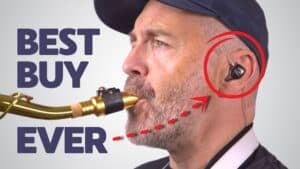
Why Camille Thurman Gave Up Music, and What Brought Her Back
- By Jay Metcalf
- Inspiration/Motivation, Saxophone Interviews

Check out the audio podcast version of this post on Apple Podcasts or Spotify.
My guest in this interview is Camille Thurman, an incredible saxophonist, vocalist, composer, and educator. In our conversation we talk about why she almost gave up music entirely, but how supportive teachers and fellow musicians brought her back which led to playing with Wynton Marsalis and the Lincoln Center Jazz Orchestra not long after.
Importance of Supportive Spaces in Music
Camille shares her journey from a discouraging high school experience to success in the music industry. Despite initial setbacks due to budget cuts and lack of access to music programs, her passion for music persisted. It was through the support of dedicated teachers that she found encouragement to pursue her musical aspirations. This provided Camille with a safe space to learn and grow, instilling in her the belief that mistakes can be a part of the learning process and should be respected rather than ridiculed.
Overcoming Gender Bias in Music
Camille reflects on the challenges faced by women in the music industry, particularly in jazz. She discusses the importance of representation and visibility, noting that many young women, including herself, lacked role models in the industry during their formative years. She emphasizes the impact of streaming technology in expanding access to diverse musical performances and role models. Through platforms like social media and online streaming, women musicians are gaining visibility and inspiring the next generation of talent. She also talks about the need for continued efforts to create equal opportunities for women in all facets of the music business.
Representation in Music
As Camille highlights the progress made in showcasing women’s contributions to music, she knows that there is still work to be done. The historical absence of women’s achievements in music from mainstream narratives is gradually being rectified, thanks to increased awareness and accessibility. Thurman emphasizes the importance of celebrating the legacy of women musicians from past eras and integrating their stories into educational curricula. By creating inclusive spaces where diverse voices are heard and respected, the music industry can continue to evolve towards equality and diversity.
Haven Hang- Creating a Haven for Women Musicians
During the pandemic, Camille found herself yearning to create and interact with fellow musicians, missing the essential connection they share when playing. Reflecting on her own experiences and receiving messages from young women seeking guidance, she envisioned a platform where they could ask questions and receive wisdom directly from accomplished female musicians. Thus, The Haven Hang was born, providing a virtual space for women at any stage of their musical journey to seek advice and learn from others.
The primary focus of The Haven Hang is personal development, aiming to amplify the stories and struggles behind the success of female musicians. Through 15 episodes featuring prominent figures like Dee Dee Bridgewater and Crystal Torres, Camille fosters a community where individuals worldwide can engage with shared experiences and insights. Beyond the pandemic, The Haven Hang has expanded to in-person events at colleges and universities, broadening its impact on aspiring musicians.
Navigating Identity as a Musician
Camille Thurman, a talented saxophonist and vocalist, shares her journey of discovering her musical identity and overcoming societal expectations. From singing alongside her mother in church to emulating her idol, Sarah Vaughan, Camille’s passion for music was evident from a young age. However, she grappled with stereotypes and pressures, initially concealing her singing abilities to be accepted as a saxophonist. It wasn’t until college mentors encouraged her to embrace both talents that she realized the power of being a vocalist and instrumentalist.
Throughout her career, Camille emphasizes the importance of communication and listening in music. She encourages aspiring musicians, especially women, to find mentors, seek answers to their questions, and surround themselves with supportive communities. By sharing her story and insights, Camille inspires others to embrace their unique musical identities and navigate the challenges of pursuing a career in music with resilience and joy.
More Posts
Jay Metcalf
Leave a Comment
Your email address will not be published. Required fields are marked *
COURSES FOR
EVERY LEVEL
filter by difficulty using the tabs
- All
- Advanced
- Beginner
- Bundle
- Free
- Intermediate
- All
- Advanced
- Beginner
- Bundle
- Free
- Intermediate







Add your first comment to this post